








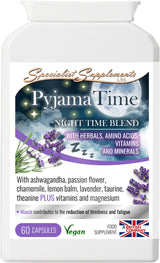
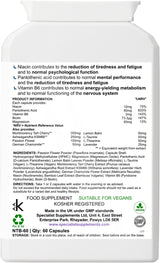
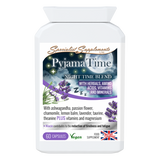
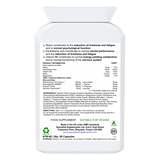
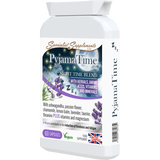
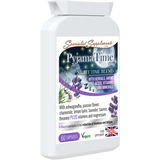

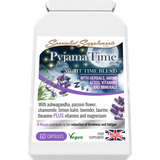
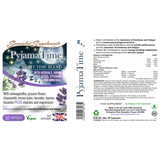
PyjamaTime
Looking for a natural way to improve your sleep quality and wake up feeling refreshed and energized? Look no further than PyjamaTime! This unique supplement is packed with a blend of herbs, amino acids, vitamins, and minerals that work together to support relaxation and sleep quality.
The combination of Montmorency tart cherry, ashwagandha, passion flower, German chamomile, lemon balm, and lavender creates a powerful formula that calms the mind and promotes relaxation. These natural ingredients have been traditionally used to improve sleep quality and help you achieve a restful night's sleep.
In addition to these natural ingredients, PyjamaTime also contains L-Taurine and L-Theanine, which work to promote changes in the brain that support sleep. And with niacin, pantothenic acid, vitamin B6, biotin, and magnesium, PyjamaTime provides the added benefits of contributing to normal psychological function, normal energy metabolism, normal functioning of the nervous system, and the reduction of tiredness and fatigue.
So if you're looking for a natural and effective way to improve your sleep quality, PyjamaTime is the perfect solution. Wake up feeling refreshed and energized every morning with PyjamaTime..
-60 capsules per pot
-Pot base = 22mm x 88mm; pot height = 142mm
-Suitable for vegetarians and vegans
-Kosher approved
-Take 1 or 2 capsules with water in the evening.
-Night time formula
Take 1 or 2 capsules with water in the evening.

-
Sleep Cycles: Sleep is not a continuous state but is divided into several cycles, with the two main types being REM (Rapid Eye Movement) and non-REM sleep. Each cycle typically lasts around 90 minutes, and a complete sleep cycle consists of both types of sleep.
-
Sleep Position: The most common sleep position is on your side, followed by sleeping on your back and then your stomach. The position you sleep in can affect your health and comfort.
-
Dreaming: Everyone dreams, even if they don't always remember their dreams. Most dreams occur during the REM stage of sleep, and they can be vivid and bizarre.
-
Sleep Paralysis: Sleep paralysis is a phenomenon where you temporarily cannot move or speak while falling asleep or waking up. It often comes with vivid hallucinations and can be frightening.
-
Sleepwalking: Sleepwalking, or somnambulism, is more common in children but can occur in adults too. It involves performing complex actions while asleep, often with no memory of it later.
-
Sleep Requirements: The amount of sleep needed varies by age. Adults typically require 7-9 hours of sleep per night, while infants need 14-17 hours. Teenagers often need more sleep than adults, around 8-10 hours per night.
-
Sleep Debt: If you consistently don't get enough sleep, you can accumulate a sleep debt. This can lead to fatigue, mood disturbances, and impaired cognitive function.
-
Circadian Rhythm: Your body has a natural internal clock, known as the circadian rhythm, which regulates your sleep-wake cycle. It is influenced by factors such as light and temperature.
-
Nocturnal Animals: Many animals are nocturnal, meaning they are most active during the night and sleep during the day. This includes owls, bats, and some species of rodents.
-
Microsleeps: Microsleeps are brief, involuntary periods of sleep that can last for a few seconds. They often occur when a person is sleep-deprived and can lead to dangerous situations, such as when driving.
-
Sleep and Memory: Sleep is essential for memory consolidation. During deep sleep, your brain processes and stores information from the day, helping you learn and remember.
-
Sleep Disorders: There are various sleep disorders, including insomnia (difficulty falling or staying asleep), sleep apnea (breathing interruptions during sleep), and narcolepsy (excessive daytime sleepiness).
-
Sleep and Creativity: Research suggests that sleep can boost creativity and problem-solving abilities. Some of history's greatest inventors and artists have credited their breakthroughs to dreams or moments of insight during sleep.
-
Sleep Across Species: Different animals have varying sleep patterns. For example, dolphins and some birds can sleep with one hemisphere of their brain at a time, allowing them to remain alert while resting.
-
Sleep and Growth: Growth hormone is primarily released during deep sleep, which is why children and teenagers need more sleep during their growth years.
-
Sleep Aids: Many cultures have traditional remedies to help with sleep, such as herbal teas, warm milk, or relaxing rituals before bedtime.
Remember that sleep is a crucial aspect of overall health and well-being, and getting enough quality sleep is essential for maintaining physical and mental health.
